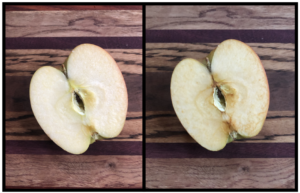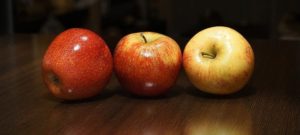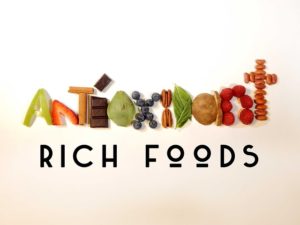 What do you think of when you hear the term “antioxidant?”
What do you think of when you hear the term “antioxidant?”
Most of us have heard this buzzword thrown around when a food is described as “healthy.” Or, you may have seen it on the front of the boxes in the cereal aisle.
But, do we really understand what antioxidants are and what they do for our bodies and our health?
 Understanding antioxidants is VERY IMPORTANT! With the alarming prevalence of cancer, heart disease and other illnesses, we strongly believe what we eat (antioxidants included) plays a HUGE role to help our bodies prevent and fight these conditions!
Understanding antioxidants is VERY IMPORTANT! With the alarming prevalence of cancer, heart disease and other illnesses, we strongly believe what we eat (antioxidants included) plays a HUGE role to help our bodies prevent and fight these conditions!
Think about a car that is rusting or an apple that turns brown when it is cut. These are examples of oxidization. The same thing happens in our bodies when “free radicals” turn destructive.
What are free radicals?
 Free radicals are kind of like when a teenager invites a couple friends over while his or her parents are out of town. A couple friends is no problem, but then more “friends” start showing up and the party can quickly turn destructive!
Free radicals are kind of like when a teenager invites a couple friends over while his or her parents are out of town. A couple friends is no problem, but then more “friends” start showing up and the party can quickly turn destructive!
Without getting too scientific, free radicals are produced by our bodies to aid in digestion and convert food into energy. They are a friend to our body’s natural functions…up to a point. When there are too many free radicals, they turn destructive and damage healthy cells inside our bodies. This destruction contributes to dreaded diseases like cancer, heart disease, Alzheimer’s and Parkinson’s as well as conditions like cataracts, asthma and bronchitis.
There are a variety of contributors to excess free radicals, including consuming foods that are fried, highly processed or contain preservatives and additives. For example, when you eat fried foods, the oils they are cooked in can oxidize at high temperatures, creating destructive free radicals in your body. These free radicals destroy your healthy cells just like the air turns the apple to an unappetizing brown.
How do antioxidants help with free radicals?
 Antioxidants are nutrients that slow oxidization and prevent damage caused by free radicals. Think about the apple. When you cut it, you can use lemon juice (which is high in Vitamin C – an antioxidant) to keep the apple from turning brown.
Antioxidants are nutrients that slow oxidization and prevent damage caused by free radicals. Think about the apple. When you cut it, you can use lemon juice (which is high in Vitamin C – an antioxidant) to keep the apple from turning brown.
Antioxidants provide this same protection in our bodies. They help prevent the destruction caused by free radicals! This is so important, we want to say it again — antioxidants help prevent the destruction caused by free radicals, significantly reducing the risk of cancer, stroke, heart disease and many other medical conditions!
So how do we load up on these amazing health defenders?
 You guessed it – through REAL FOODS like fruits, vegetables, beans, whole-grains, nuts & seeds, and herbs & spices.
You guessed it – through REAL FOODS like fruits, vegetables, beans, whole-grains, nuts & seeds, and herbs & spices.
Antioxidants come in many forms. Common antioxidants include vitamins C, E, and beta carotene. Since beta carotene turns into vitamin A in our bodies as needed, you can remember these easily as “ACE.” Others include carotenoids (including lycopene), selenium, flavonoids, resveratrol, among many others.
How in the world do you remember all these different antioxidants?
Good news — you don’t have to! Don’t worry about memorizing all these different antioxidants…all you have to do is eat a wide variety of REAL FOODS! Here are some examples of foods high in antioxidants:
 Fruits and vegetables. A wide variety of fruits and vegetables will help protect your body against the damage caused by free radicals. Great sources include dark leafy greens (like kale and spinach), blueberries, blackberries, broccoli, grapes, asparagus, avocado, artichokes, onions, bell peppers, tomatoes, chili peppers, garlic, sweet potatoes…and SO MANY more!
Fruits and vegetables. A wide variety of fruits and vegetables will help protect your body against the damage caused by free radicals. Great sources include dark leafy greens (like kale and spinach), blueberries, blackberries, broccoli, grapes, asparagus, avocado, artichokes, onions, bell peppers, tomatoes, chili peppers, garlic, sweet potatoes…and SO MANY more!
- Nuts and seeds. Again, variety is key. Almonds, pecans and walnuts are all great options. Brazil nuts are an excellent source of selenium.
- Herbs and spices. Not only do herbs and spices add great flavor to your meals, but they are packed with antioxidants. Allspice, cinnamon, oregano, thyme, sage and rosemary are all great sources. Turmeric is a fantastic source of curcumins, a very powerful antioxidant.
- Beans. Black beans, lentils, kidney beans and pinto beans are especially good sources of antioxidants.
- Whole grains. The word “whole” is very important. Oats, brown rice and even popcorn are good sources of antioxidants. Keep in mind, refined grains are NOT a good source of antioxidants because the bran and germ have been removed during processing…and that’s where the antioxidants live!
 Dark chocolate. Yes, raw cocoa and certain dark chocolates are great sources of antioxidants. However, they can taste bitter to some people. The more they are processed and other ingredients are added, the antioxidant benefit diminishes. Especially if it is processed with alkali, the nutritional benefits dramatically decrease. Aim for the highest % of cacao possible (ideally 70% or higher) and avoid chocolate that is processed with alkali.
Dark chocolate. Yes, raw cocoa and certain dark chocolates are great sources of antioxidants. However, they can taste bitter to some people. The more they are processed and other ingredients are added, the antioxidant benefit diminishes. Especially if it is processed with alkali, the nutritional benefits dramatically decrease. Aim for the highest % of cacao possible (ideally 70% or higher) and avoid chocolate that is processed with alkali.
- Coffee and tea. Green tea is an especially good source of antioxidants. Try to minimize or avoid the added sugars, which can quickly overcome the benefits that come from the antioxidants.
What else should we know about antioxidants?
 Antioxidants work cooperatively. It’s like that quote from Mother Teresa…
Antioxidants work cooperatively. It’s like that quote from Mother Teresa…
Antioxidants provide even more powerful protection when they are allowed to work collaboratively.
By focusing on a wide variety of REAL foods mentioned above, you will get a fantastic combination of disease fighters.
Benefits beyond the antioxidants…
By making these foods the focus of your diet, you will automatically get many other benefits. For example, these foods will reduce inflammation in your body, provide fiber to reduce cholesterol and stabilize blood sugars, and so much more!
Use caution with supplements…
Studies have not proven that the “isolated” forms of antioxidants in supplements work like foods. In some studies, antioxidant supplements have actually proven to trigger new health problems. We encourage getting your antioxidants from foods and seek expert advice if considering supplements.
Now you know why the term “antioxidant” is more than just a buzzword and why the power of REAL FOOD is so amazing!
Do you believe what we eat has a significant effect on our health and risk of illness?
Are there other buzzwords you would like to know more about? Please share with us!




Leave A Comment